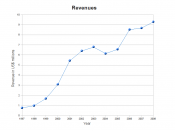Newfoundland Telephone Company Ltd.
&
The Message Relay Service
CASE STUDY (SWOT ANALYSIS)
The Newfoundland Telephone Company (NewTel) has identified, through letters from the president of the St. John's Association of the Deaf, the need to consider the implementation of Message Relay Services (MRS). The new technology, which will benefit the consumer, is viewed by corporate managers as a social / ethical responsibility unlikely to generate revenue, and with a predicted downturn in the province's economy, projected revenues for 1990-91 look gloomy.
Established in 1919 as the Avalon Telephone Company, NewTel has stood the test of time and increased in size and services throughout the decades. In 1988 NewTel made the purchase of Terra Nova, their only major competitor becoming a monopoly as the only supplier of telephone services in all geographical areas of the province.
Prior to 1989 NewTel was regulated by the Newfoundland Public Utilities Commissions (NPUC), and since by the CRTC. Due to revenue shortfalls Newtel put in an application to increase rates. This was the first application since 1982 and the first to the CRTC.
With a solid history and foundation, and having established a monopoly, NewTel realized newfound strengths. With no competition they gained total market share. A strong management and executive team back their social / ethical responsibilities, proactive approaches, and strategies.
The weakness within NewTel is their inability to increase revenues or to implement the new MRS service at a cost benefit.
NewTel is faced with various threats. The application to the CRTC requires more paperwork and lead-time for every interaction, the CRTC is less flexible than the NPUC, and could force NewTel to implement MRS services and reject the proposed rate increase.
NewTel, by becoming a monopoly, now faces higher chances of competition from companies under the Terminal Services Agreement...


